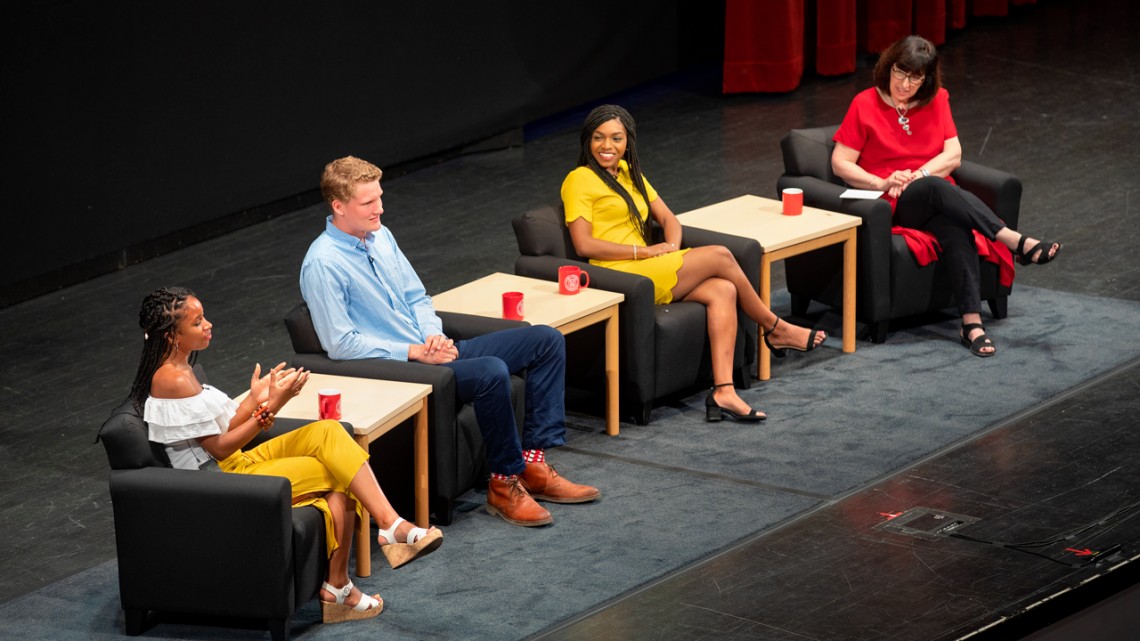
From left, Imani Majied ’19, William Schorsch Goetz ’20 and Carúmey Stevens ’19 join President Martha E. Pollack in a conversation during Reunion about the student experience.
Students share Cornell experiences with President Pollack
By Daniel Aloi
President Martha E. Pollack queried three young Cornellians – two recent graduates and one rising senior – on their most interesting and challenging Cornell experiences, making connections on a diverse campus, and their advice to incoming freshmen in a conversation June 8 in Bailey Hall, as part of Reunion 2019.
“The point of this morning session is to give you a sense of what’s going on at Cornell today,” Pollack said to the audience. “And who knows that better than the students?”
She began the conversation with a question for the students: “What’s the most interesting educational experience, either inside or outside of the classroom, that you’ve had at Cornell?”
Carúmey Stevens ’19 related her initial surprise when she enrolled in the College of Human Ecology’s Human Development Public Engagement Program, a translational research program geared to community needs.
“You walk into the classroom expecting a syllabus and to find out when the prelims are and when the problem sets are due,” she said. “But we didn’t even have a syllabus. Our professor walked in and said, ‘OK, what do you guys want to do?’ It was … a little bit of a learning curve.”
“But,” she continued, “we got to go into communities and see, what did they need? What can we help with? And how can we use the research that we have on youth development, on psychology and development to help the community? It’s a really cool, interesting experience, inside and outside of the classroom.”
Imani Majied ’19 said a for-credit internship in her junior year at the ILR School allowed her to learn about disability issues in another country.
“I was working at this place called the Center for Social Innovation in Singapore, [with a project on] helping to promote the inclusion of people with disabilities,” she said. “In Singapore, there’s no legal definition for discrimination. I learned so much about how Singapore valued human capital in a very different way than in the United States.”
When Pollack asked about their most challenging experiences, economics major and heavyweight rower William Schorsch Goetz ’20 said: “One of the biggest things that I’ve found is that energy is at a premium when you’re in college. You have to make sure you use that time wisely. So one thing for me has been, I always have exams and I always have practice before those exams. And it’s how do I manage … so that I can properly give to the best of my ability and do as well as I can academically.”
Majied said her biggest challenge was “when I first got here, quickly learning that I would fail often. That here, at Cornell, it would be OK. That was really hard for me to adjust to.”
As a freshman, Stevens found she didn’t have much background in the core subjects for her human development major.
“It was pretty nerve-wracking,” she said. “I dealt with a lot of imposter syndrome, the feeling that I didn’t belong. But I really used my resources. … Yes, Cornell is hard; the rumors are true. But there are so many resources on campus that you can utilize that will really support your academic growth, so that you don’t have to survive, you can actually thrive.
“I really depended on the Office of Academic Diversity Initiatives, where they gave me my own personal tutor for my physiology classes, and the Learning Strategies Center,” she said. “And it ended up working out pretty much OK.”
Pollack then asked the students how the university’s location in Ithaca influenced their time here.
“When I got into Cornell, I think I was told that Ithaca was a metropolitan area,” Majied said, to laughter from the audience. “I love the people here, I feel like I’ve been able to really connect with people in the community, who are … connected to the community in such a beautiful way that has been inspiring to me.”
“What made it easier to make connections with people from different perspectives and different backgrounds?” Pollack asked.
“Cornell has over 14,000 students,” Majied said. “So my first group of friends were really my dorm, freshman year, so that became like my family right off the bat. … When you meet people, sometimes the first question you ask them is, ‘What clubs are you in?’ So then you know who they know.”
When asked for advice to give new students, Goetz said, “Go to class. The more you get involved in class, the more fun you’ll have.”
“Take those opportunities and use those resources,” Stevens said. “Cornell has so much to offer. … Tomorrow, I’m actually going to Morocco” on a Cornell Tradition service learning trip, she said.
Media Contact
Get Cornell news delivered right to your inbox.
Subscribe
